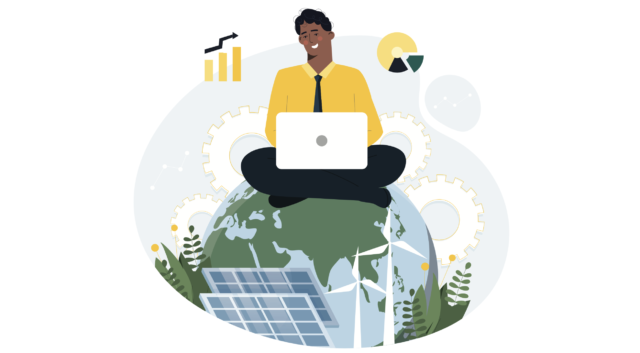A fundamental strategic shift demands a new leadership mindset and skillset.
In little over the space of a decade, business leaders’ roles have shifted dramatically. A few years ago, leaders may have ‘kept their heads down’ to focus on business, leaving political leaders to tackle societal challenges – but these days, business, civic and political leaders must work in partnership. Business leaders must engage with major challenges such as climate change and other environmental, social and governance (ESG) issues through their core business, and recognize that addressing societal challenges is essential to creating value. Leaders need to have a nuanced understanding of major societal forces and know where, and how, to act for the good of their organization and the wider world.
Developing this new leadership mindset and skillset requires thinking from business leaders at all levels. A recent study from the UN Global Compact and Russell Reynolds Associates, Leadership for the Decade of Action, found that 92% of business leaders believe integration of sustainability issues is critical to business success but only 4% of C-suite role specifications demand sustainability experience or mindsets.
As they look to translate strategy into reality, how can today’s business leaders learn to act differently to earlier generations?
The new agenda
We held conversations with chief executives and senior leaders at more than 30 organizations recognized as leading on sustainability and global challenges. We explored two things. What experiences do senior leaders credit for helping to shape their mindsets and develop their skills? Second, what lessons can be learned from innovations in leadership development as organizations they pursue these new kinds of leadership skills and mindsets? Our research found three key areas that business leaders need to address if they are to embed sustainability in their organizations.
1 A new leadership mindset
Today’s business leaders need to see addressing social challenges as at the heart of their job description. They are leaders in society as much as leaders of their businesses. Rather than seeing a trade-off between doing good and making money, business leaders need to aim to achieve each through the other.
2 A new skillset for leading change inside the organization
Chief executives see their new role as influencing change in their organizations to open up space for others to behave differently.
3 A new skillset for leading change outside the organization
Chief executives now see it as their role to lead their organization’s wider ecosystem, proactively leading change in consumer and supplier behavior, industry norms and government policy.
From these findings emerge some key takeaways for business leaders. Firstly, they must develop a nuanced understanding of the major societal forces shaping our world. The new horizon to their role has required leaders to develop skills in areas that historically have not been a conventional part of the business leader’s repertoire: contributing to public debate with an informed point of view, relating well with multiple constituencies, engaging in dialogue to understand and empathize with groups and communities with perspectives contrary to one’s own, and engaging in multi-stakeholder collaboration with unconventional partners.
Mark Foster, former group chief executive at Accenture, summed up how his thinking about his role had changed as a journey of “understanding that there was a world out there, above and beyond the piece of business you’re in”. However, more is required than just taking in lectures on global trends.
First-hand experiences
Our research suggests that first-hand experiences are at the heart of what it takes for business leaders to build the emotional connection and commitment to put the ESG agenda front and center in their work. While each story was unique, a few key themes emerged when analyzing leaders’ accounts of what had helped shape their mindsets and skills. For some it was formative experiences in their upbringing, at university or at business school. For others it was influential mentors or participation in professional networks focused on ESG issues; first-hand experiences such as engaging with people living in poverty; personal experience of ESG challenges such as the impacts of climate change; or first-hand experiences of the changing interests of key partners and stakeholders.
Many leaders described these moments vividly. Paul Walsh, chief executive of Diageo, talked about the powerful impact of being exposed to the realities of people’s lives in water-stressed parts of the world where Diageo does business. Neville Isdell, the former chief executive of The Coca-Cola Company, credited an influential sociology professor, his involvement in student activism and his training as a social worker in Cape Town’s shanty towns in the polarized atmosphere of 1960s South Africa. Those experiences were a potent combination that shaped the positions he took as CEO on issues like human rights, climate change and water scarcity.
Mark Foster told us that as Accenture’s chief executive he had tried to give a week a year to Accenture Development Partnerships, “for them to send me somewhere and engage with their programs”. That was both a powerful signal to the organization of his priorities, and a way to access the first-hand experiences that are at the heart of what it takes for business leaders to build an emotional connection and deep commitment.
Building such experiences into leadership development programs gives senior executives the chance to develop relationships with people who are confronted by some of the world’s most pressing challenges, and with people and organizations working to help address these challenges, including key organizational stakeholders.
There are hopeful signs that at least some senior executives have recognized the business, environmental and societal imperatives for change, and have started to shift their mindsets and practices. But there are still too many leaders who are stuck in past perspectives. For the sake of humankind, business leaders need to accelerate their ESG transitions, before it’s too late.
Matt Gitsham is professor of business and sustainable development at Hult International Business School.

